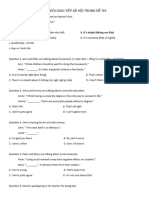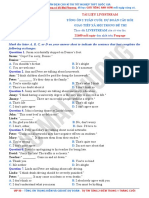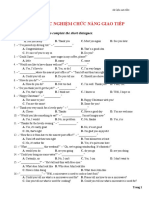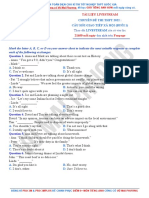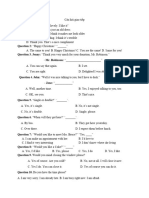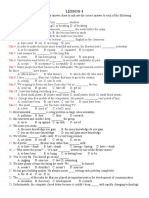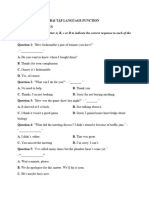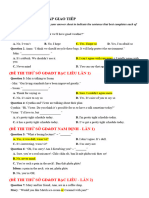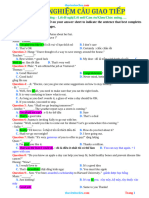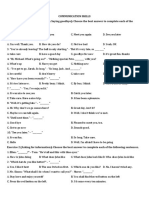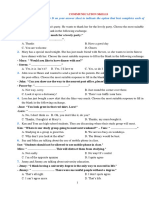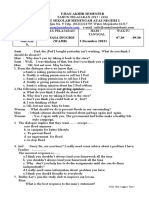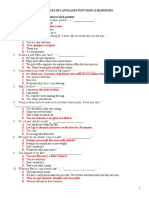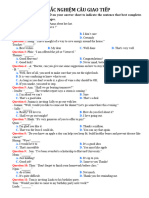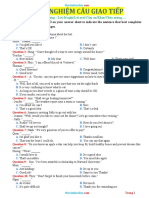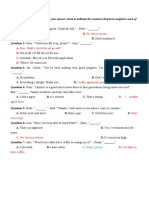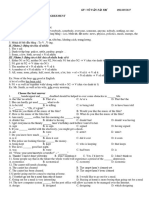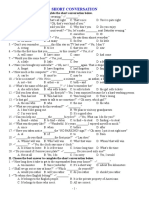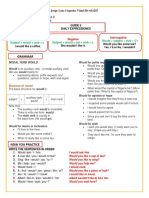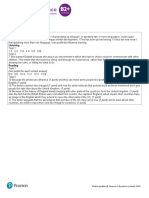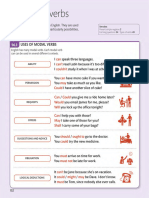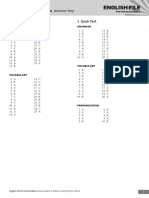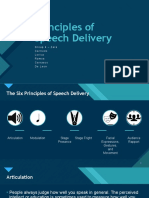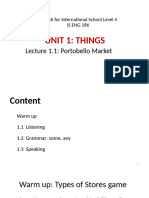0 ratings0% found this document useful (0 votes)
81 viewsReported Speech
Reported Speech
Uploaded by
Quyen DangThis document contains a grammar lesson about reported speech. It provides examples of direct statements and how to change them into reported speech by modifying pronouns, verb tenses, time words and locations while keeping the meaning the same. It also contains a practice test with multiple choice questions about communicative exchanges.
Copyright:
© All Rights Reserved
Available Formats
Download as DOC, PDF, TXT or read online from Scribd
Reported Speech
Reported Speech
Uploaded by
Quyen Dang0 ratings0% found this document useful (0 votes)
81 views10 pagesThis document contains a grammar lesson about reported speech. It provides examples of direct statements and how to change them into reported speech by modifying pronouns, verb tenses, time words and locations while keeping the meaning the same. It also contains a practice test with multiple choice questions about communicative exchanges.
Original Description:
Exercises
Copyright
© © All Rights Reserved
Available Formats
DOC, PDF, TXT or read online from Scribd
Share this document
Did you find this document useful?
Is this content inappropriate?
This document contains a grammar lesson about reported speech. It provides examples of direct statements and how to change them into reported speech by modifying pronouns, verb tenses, time words and locations while keeping the meaning the same. It also contains a practice test with multiple choice questions about communicative exchanges.
Copyright:
© All Rights Reserved
Available Formats
Download as DOC, PDF, TXT or read online from Scribd
Download as doc, pdf, or txt
0 ratings0% found this document useful (0 votes)
81 views10 pagesReported Speech
Reported Speech
Uploaded by
Quyen DangThis document contains a grammar lesson about reported speech. It provides examples of direct statements and how to change them into reported speech by modifying pronouns, verb tenses, time words and locations while keeping the meaning the same. It also contains a practice test with multiple choice questions about communicative exchanges.
Copyright:
© All Rights Reserved
Available Formats
Download as DOC, PDF, TXT or read online from Scribd
Download as doc, pdf, or txt
You are on page 1of 10
UNIT 3: WAYS OF SOCIALISING
PART 1: Communicative Exchange
Question 1. A: “How do you do?” ~ B “_________”
A. How do you do? B. I’m a bartender
C. Everything is OK! D. I’m very fine, thanks!
Question 2. Mary: “You stepped on my toes!” ~ James: “________.”
A. Are you sure? It’s understandable. B. I’m sorry but I meant it.
C. Really! I’m glad you like it. D. I’m terribly sorry. I didn’t mean it.
Question 3. Josh and Mike are talking about hobbies.
Josh: “ What is your hobby Mike?” Mike: “___________”
A. Well, I like hiking. B. Well, I want sugar
C. Sure, I’ll go with you. D. Oh, I live here.
Question 4. John and Smith are talking about solar energy.
John: “Solar energy is not only plentiful and unlimited but also clean and safe. Do you think so?”
Smith: “____________”
A. Thanks for your kind words. B. Thank you, I’m fine at the moment.
C. Thank you for your consideration. D. Yeah. You’re absolutely right.
Question 5. Tim: “Let me wash the vegetable while you’re preparing the meat.” -Linda:
“________.”
A. OK. Thank you very much. B. Good idea. I'll do it for you.
C. Yes, please. But I can manage. D. No problem.
Question 6. Sara: "How do you feel about his comment?" - Mary: “_____________.”
A. Yes, it's a very good idea. B. I don't think he knew what he was saying.
C. I'm afraid I disagree with you. D. If you ask me, I feel tired.
Question 7. Hoa is asking Hai, who is sitting at a corner of the room, seeming too shy.
Hoa: “Why aren’t you taking part in our activities? _____________” Hai: “Yes, I can. Certainly.”
A. Could you please show me how to get the nearest post office?
B. Shall I take your hat off?
C. Can you help me with this decoration?
D. Can I help you?
Question 8. Mary is talking to a porter in the hotel lobby.
Porter: “Shall I help you with your suitcase?” Mary: “___________________”
A. What nonsense! B. That’s very kind of you.
C. What a pity! D. I can’t agree more.
Question 9. Jane and Suzie are talking after school.
Tom: “I’m awfully sorry I can’t go with you.” Mary: “__________? Haven’t you agreed?”
A. Why do you think B. How come C. What is it D. Why don’t you
Question 10. Peter and Mike are talking during a class break.
Peter: “What are you doing this weekend?” Mike: “_______________.”
A. I’m very busy now B. I plan to visit my aunt
C. I think it will be interesting D. I hope it isn’t raining
Question 11. John : “Don’t fail to send your parents my regard.” - Mary: “ ____________.”
A. Thanks, I will B. You’re welcome C. Good idea, thanks D. It’s my pleasure
Question 12. Tom: “Do you have a minute please?” - Tony: “ ________________.”
A. Sorry. I left my watch home B. That’s just fantastic. Thanks
English 12- Unit 3 1
C. Yes, but you should be brief D. Well it is not as good as I think
Question 13. A: “I’m very sorry for letting you wait for so long.” – B: “ _____________”
A. Don’t apologize. I’ve just arrived here. B. It doesn’t matter. Thank you.
C. You’ve welcome. D. My pleasure. Don’t worry about it.
Question 14. “Would you like me to send this package for you?” – B: “___________”
A. That would be nice. Any problems? B. Yes, please, if you don’t mind.
C. I’m sorry, but here you are. D. No, thanks. I’m really busy.
Question 15. Bush: “________________.” - Clinton: “No, but thanks all the same.”
A. Another cup of coffee? B. May I help you?
C. Would you like a slice of salad? D. How about having dinner out?
Question 16. Tom: “Would you please drive me to class today?” - Thuy: “______________.”
A. No, I don’t mind B. You are welcome
C. Yes, I’d be glad to D. Thank you for all
Question 17. Mai and Lan are talking about Mai’s new house.
- Lan: “What a lovely house you have!” Mai: “________________”
A. I’m glad you like it. Thanks. B. Thanks. It must be very expensive.
C. You’re welcome. D. Certainly!
Question 18. Lora is talking to Maria about her failure at applying for a job.
- Lora: “__________” Maria: “Never mind, better luck next time”
A. I have a lot on my mind. B. I’ve broken your precious vase.
C. I couldn’t keep my mind on work. D. I didn’t get the vacant position.
Question 19. - John: “Oh, I forgot my girlfriend's birthday last week.” - Anne: “_________.”
A. Not on your life. B. So I guess you are in the doghouse again.
C. Sure, knock on wood. D. You really should get a life.
Question 20. - Porter: “I didn’t do too well on my final exams.” - Mary: “___________.”
A. That's a shame! B. Don’t mention it! C. What a drag! D. That will be the day
PART 2: GRAMMAR
REPORTED SPEECH: CAÂU TÖÔØNG THUAÄT
A. Caâu phaùt bieåu. (statements in reported speech)
1/ Ví duï :
- He said : “ I have lost my pen this morning.”
He said that he had lost his pen that morning.
- She said to him: “I will go with you tomorrow.”
She told him that she would go with him the next day.
2/ Ghi nhôù : muoán ñoåi moät caâu tröïc tieáp sang caâu giaùn tieáp, ta phaûi :
+ Giöõ nguyeân ñoäng töø giôùi thieäu said hoaëc ñoåi said to thaønh told neáu coù tuùc
töø.
+ Boû daáu hai chaám (:) vaø ngoaëc keùp (“…”) roài theâm lieân töø that.
+ Thay ñoåi ñaïi töø nhaân xöng, tính töø sôû höõu… theo qui taéc sau : Ngoâi thöù 1 ñoåi
thaønh ngoâi thöù nhö chuû töø ôû meänh ñeà chính. Ngoâi thöù 2 ñoåi thaønh ngoâi thöù cuûa
tuùc töø. Ngoâi thöù 3 giöõ nguyeân khoâng ñoåi.
English 12- Unit 3 2
+ Thay ñoåi thì cuûa ñoäng töø trong caâu tröïc tieáp baèng caùch cho luøi veà quaù khöù
moät baäc. Cuï theå nhö sau :
Direct speech Reported speech
- simple present (S+ am, is, are/ S+ Vo, s, es) - simple past (S+ was,were/ V2,ed)
- present continuous (S + am, is, are +Ving) - past continuous (S+ was, were+ Ving)
- present perfect (S+ have, has + V3,ed) - past perfect (S+ had V3,ed)
- simple past (S+ V2,ed) - past perfect (S+ had V3,ed)
- past continuous - past perfect continuous
(S+ was, were Ving) (S + had been Ving)
- present perfect cont - past perfect continuous
(S+ have, has been Ving) (S + had been Ving)
- simple future(S + will Vo) - present conditional (S+ should/would)
- past perfect (S+ had v3,ed) - unchanged (khoâng ñoåi)
- perfect conditional - unchanged
+ Thay ñoåi moät soá töø chæ thôøi gian vaø nôi choán.
- now - then
- today / tonight - that day / that night
- tomorrow - the following day / the next day
- yesterday - the previous day / the day before
- next week / month… - the following week / month…
- last week /month… - the week before /the month before…
- the day before yesterday - two days before
- the day after tomorrow - in two days’ time
- ago - before
- tomorrow morning - the following morning
- last Tuesday - the Tuesday before
- right now - at once
- here - there
- this / these - that / those
- He said : “ I’ll come here to take this book.”
He said that he would come there to take that book.
- They said to us : “You must do this work right now.”
They told us that we had to do that work at once.
Chuù yù :
* Khi caâu tröïc tieáp bieåu thò moät taäp quaùn, moät söï thaät hay moät chaân lyù thì khi
ñoåi sang caâu giaùn tieáp thì cuûa ñoäng töø khoâng thay ñoåi.
- The lecturer said : “The earth moves round the sun.”
The lecturer said that the earth moves round the sun.
- The teacher said to them : “The Second World War ended in 1945.”
The teacher told them that the Second World War ended in 1945.
* Khi caâu ñoäng töø giôùi thieäu ôû hieän taïi ñôn, thì cuûa ñoäng töø trong caâu giaùn
tieáp khoâng ñoåi vaø caùc töø chæ thôøi gian hoaëc nôi choán vaãn giöõ nguyeân.
- The doctor says to her : “You will have to stay here until tomorrow.”
English 12- Unit 3 3
The doctor tells her that she will have to stay here until tomorrow.
B. CAÂU HOÛI. (Questions in reported speech)
1/ Ví duï :
- She said to me : “Do you like swimming ?”
She asked me if I liked swimming.
- Tom said : “Has she finished her home work ?”
Tom wanted to know if she had finished her homework.
- He asked me : “Why did you come home so late last night?”
He asked me why I had come home so late the night before.
- Mary said : “ What’s he doing now?”
Mary wondered what he was doing then.
2/ Ghi nhôù :
+ Ñoåi said thaønh asked (coù hoaëc khoâng tuùc töø theo sau), wondered hay wanted to
know (khoâng coù tuùc töø).
+ Boû daáu hai chaám (:), daáu ngoaëc keùp (“…”) vaø daáu chaám hoûi (?) vaø giöõ laïi
question-word (nhö what, where, how…) neáu laø caâu hoûi noäi dung (Wh-questions) hoaëc
theâm if (hay whether) neáu caâu hoûi coù hay khoâng (Yes-no questions).
C. CAÂU MEÄNH LEÄNH. (Commands in reported speech)
1/ Ví duï :
- The teacher said : “Go to the blackboard, John.”
The teacher told John to go to the blackboard.
- He said to them : “Don’t be late tomorrow.”
He told them not to be late the next day.
Toùm taét Caâu giaùn tieáp (reported speech)
Statements * S + said + (that) + clause
(Caâu phaùt bieåu) * S + told + O + (that) + clause
Commands * S + told + O + to infinitive
(Caâu meänh leänh) * S + told + O + not + to infinitive
* S + asked + (O) + wh-… + clause
Wh-questions * S + wondered + wh-… + clause
(Caâu hoûi noäi * S + wanted to know + wh-… + clause
dung)
* S + asked + (O) + if / whether + clause
Yes-no questions * S + wondered + if /whether + clause
(Caâu hoûi coù * S + wanted to know + if / whether + clause
khoâng)
2/
Ghi nhôù :
+ Ñoåi said hay said to thaønh told hay asked vaø buoäc phaûi coù tuùc töø theo sau.
+ Duøng to ñeå thay theá cho daáu hai chaám vaø ngoaëc keùp khi laø caâu meänh leänh
xaùc ñònh vaø duøng not to khi laø caâu meänh leänh phuû ñònh.
EXERCISE I : Put into the reported speech :
1/ Tom said : “I want to buy a pocket calculator for my father.”
- _________________________________________________________
English 12- Unit 3 4
2/ She said : “I once spent a summer in this village.”
- _________________________________________________________
3/ The nurse said : “The patient in this room didn’t obey your orders, Doctor.”
- _________________________________________________________
4/ They said to me : “You taught us English last year.”
- _________________________________________________________
5/ Mr.Brown said : “Our trip cost us two thousand dollars.”
- _________________________________________________________
6/ He said to her : “ I can’t find my hat anywhere in this room.”
- _________________________________________________________
EXERCISE II : Change to the reported speech:
1/ Mr. Smith said : “Where are you going on your vacation this year ?”
- _________________________________________________________
2/ She said : “Did the mechanis finish repairing your car ?”
- _________________________________________________________
3/ She said : “Why has David been looking so miserable lately ?”
- _________________________________________________________
4/ I asked my friend : “Was anyone hurt in the car accident last month ?”
- _________________________________________________________
5/ She asked me : “How old are you now ?”
- _________________________________________________________
6/ He said to her : “Have you been to town today ?”
- _________________________________________________________
7/ John said : “How long does it take you to get to London, Mary ?”
- _________________________________________________________
8/ The policeman asked the little girl : “What’s your name ?”
- _________________________________________________________
EXERCISE III : Turn into the reported speech:
1/ The manager said : “ Come into my office, please.”
- _________________________________________________________
2/ The teacher said ro us : “Don’t make so much noise.”
- _________________________________________________________
3/ Mr.Green said : “Please come to our dinner tonight, Bill.”
- _________________________________________________________
4/ Susan said to Tom : “Don’t call me again at this late hour.”
- _________________________________________________________
5/ She said to the boy : “Show me what you have in your hand.”
- _________________________________________________________
6/ The policeman ordered : “Stay where you are and don’t touch anything.”
- _________________________________________________________
Reported Speech with Gerund and Infinitive
I. DANH ĐỘNG TỪ (V-ING) TRONG LỜI NÓI GIÁN TIẾP
English 12- Unit 3 5
Khi lời nói trực tiếp là lời đề nghị , chúc mừng, cảm ơn, xin lỗi, …động từ tường thuật cùng với
danh động từ (V-ing) theo sau nó thường được dùng để chuyển tải nội dung lời nói trên.
a. Reporting Verb + V-ing + ….
Deny (phủ nhận), admit (thừa nhận), suggest (đề nghị), regret (nuối tiếc), appreciate (đánh giá cao,
cảm kích)
Ex: Peter said: “I didn’t steal the painting.” → Peter denied stealing the painting.
“Why don’t we go out for a walk?” said the boy. → The boy suggested going out for a walk.
b. Reporting Verb + (Someone) + Preposition + V-ing + ….
- thank someone for (cám ơn ai về ….)
- accuse someone of (buộc tội ai về …)
- congratulate someone on (chúc mừng ai về ….)
- warn someone against (cảnh báo ai về ….)
- dream of (mơ về …)
- object to (chống đối về ….)
- apologize someone for (xin lỗi ai về …)
- insist on (khăng khăng dòi …)
- complain about (phàn nàn về ….)
Ex: “I’m happy to know that you win the game. Congratulations!”, Jim said to Mary.
→ Jim --------------------------------------------------------------------------------------
I said to the boy: “Don’t play ball near the restricted area.”
→ I -----------------------------------------------------------------------------------------
Daisy said: “I want to be a famous singer in the world.”
→ Daisy --------------------------------------------------------------------------------------
Note:
1. Why don’t you / Why not / How about → suggested + (someone) + V-ing …
Ex: “Why don’t you send her some flowers?” he said.
→ He suggested me sending her some flowers.
2. Let’s → suggested + V-ing …
Let’s not → suggested + not + V-ing …
Ex: “Let’s meet outside the cinema,” he said.
→ He suggested meeting outside the cinema.
She said: “Let’s not talk about that problem again.”
→ She suggested not talking about that problem again.
3. Shall we / It’s a good idea → suggested + V-ing …
Ex: “It’s a good idea to go for a picnic this weekend,” she said.
→ She suggested going for a picnic that weekend.
II. ĐỘNG TỪ NGUYÊN MẪU (TO-INFINITIVE) TRONG LỜI NÓI GIÁN TIẾP
Khi lời nói gián tiếp là một lời đề nghị, mệnh lệnh, ý định, lời hứa, lời yêu cầu, …động từ tường
thuật cùng với động từ nguyên mẫu theo sau nó thường được dùng để chuyển tải nội dung lời nói này.
a. Reporting Verb + To-inf …
- agree demand (đòi hỏi) guarantee (bảo đảm)
- hope promise swear (thề)
- threaten (đe dọa) volunteer offer (đưa ra đề nghị)
- refuse consent (bằng lòng) decide
Ex: “I will give you my book if you need it,” said my friend.
→ My friend offered to give me her book if I needed it.
English 12- Unit 3 6
b. Reporting Verb + Object + To-inf …
- ask advise command (ra lệnh)
- expect instruct (hướng dẫn) invite
- order (ra lệnh) persuade (thuyết phục) recommend (khuyên)
- remind (nhắc nhở) encourage (cổ vũ) tell
- urge (thúc giục) warn (cảnh báo) want
Ex: “Don’t forget to lock the door,” I said to my sister.
→ I reminded my sister to lock the door.
Ann said: “Come to my place whenever you are free.”
→ Ann invited me to come to her place whenever I was free.
Note:
1. Lời đề nghị: Would you / could you / Will you / Can you → asked + someone + to-inf
Would you mind / Do you mind + V-ing → asked + someone + to-inf
Ex: “Can you read the instructions again?” she said.
→ She asked me to read the instructions again.
He said: “Would you mind opening the door, please?”
→ He asked me to open the door.
2. Lời mời: Would you like / Will you → invited someone + to-inf
Ex: “Will you have lunch with me?” he said.
→ He invited me to have lunch with him.
3. Lời khuyên: Had better / If I were you / Why don’t you → advised someone + to-inf
Ex: “If I were you, I would phone her,” he said.
→ He advised me to phone her.
EXERCISES
1. You cheated in the exam,” the teacher said to his students.
a. The teacher insisted his students on cheating in the exam.
b. The teacher prevented his students from cheating in the exam.
c. The teacher advised his students to cheat in the exam.
d. The teacher accused his students of cheating in the exam.
2. My friend _______.
a. suggested going for a walk b. suggested us going for a walk
English 12- Unit 3 7
c. advised to go for a walk d. would like going for a walk
3. John _______ him carry the package.
a. thanked me for helping b. said thanking with me to help
d. told me to thank with helping d. asked me to thank and help
4. The group leader prevented his members _______.
a. from going on b. going on c. to go on d. to going onn
5. “May I go out, Mum?” – “No, I won’t let you go out.”
a. The mother prevented her child from going out. b. The mother suggested going out
c. The mother thanked her child for going out d. The mother insisted her child on going out
6. “Great! You are well-dress today, Mary” said Tommy.
a. Tommy accused Mary on being well-dress.
b. Tommy complimented Mary on being well -dress.
c. Tommy told Mary to be well-dress. d. Tommy wanted Mary to be well-dress.
7. “Thank you very much for your help, John” said Daisy.
a. Daisy thanked John for helping her. b. Daisy told John to help her.
c. Daisy wanted John to help her and said thanks. d. Daisy would like John to help her.
8. Are you the new manager, Daisy? Congratulation!” said Billy.
a. Billy looked forward to being the new manager.
b. Billy dreamed of being the new manager.
c. Billy prevented Daisy from being the new manager.
d. Billy congratulated Daisy on being the new manager.
9. Jane suggested going to the cinema.
a. Jane said, “Let’s go to the cinema, shall we?” c. Jane said, “I hate going to the cinema.”
b. Jane said, “We oughtn’t to go to the cinema.” d. Jane said, “Going to the cinema is boring”
10. “_______” the boy insisted.
a. Do you go out with me? c. Come on! Please go out with me,
b. Do you want to go out with me? d. You had better go out with me.
11. “_______,” Peter denied.
a. I did not take your umbrella c. I shouldn’t have taken your umbrella.
b. I will not take your umbrella d. I mustn’t take your umbrella
12. “______” Andy suggested.
a. Are you going for a walk? c. Could you go for a walk?
b. How about going for a walk? d. Did you go for a walk?
13. “______,” the secretary proposed.
a. Excuse me! We wilorl buy some me equipment.
b. I think we should buy some more equipment.
c. Thank you very much for some more equipment.
d. You should not have bought some more equipment.
14. “______,” the boy admitted.
a. I would like to spoil the food b. I will spoil the food
c. I’m sorry. I spoilt the food d. I must spoil the food
15. “ May I go out, Mum?” – “ No, I won’t let you go out”
a. The mother prevented her child from going out. b. The mother suggested going out.
c. The mother thanked her child for going out d. The mother insisted her child on going out.
16. The police warned me against coming near the barrier.
a. “ Please come near the barrier,” The police said.
b. “ Don’t come near the barrier,” The police said.
c. “ I would like to come near the barrier,” The police said.
d. “ Let’s come near the barrier,” The police said.
17. “ Don’t touch that flower!” the old lady said to the boy.
a. The old lady wanted the boy not touching that flower.
b. The old lady insisted the boy on touching that flower.
English 12- Unit 3 8
c. The old lady warned the boy against touching that flower.
d. The old lady congratulated the boy on not touching that flower.
English 12- Unit 3 9
10
You might also like
- Elementary Korean, Second EditionDocument266 pagesElementary Korean, Second Editionthe.volleyball.guy100% (1)
- 50 Bài Tập Chức Năng Giao Tiếp - Phần 2Document15 pages50 Bài Tập Chức Năng Giao Tiếp - Phần 2DamNo ratings yet
- Các Dạng Bài Tập Thi Tnthpt 24 GvDocument178 pagesCác Dạng Bài Tập Thi Tnthpt 24 GvNguyễn Anh DuyNo ratings yet
- Module 3 - Functional Language 1Document7 pagesModule 3 - Functional Language 1Trang Đỗ ThùyNo ratings yet
- 50 bài tập Chức năng giao tiếp - phần 1Document13 pages50 bài tập Chức năng giao tiếp - phần 1DamNo ratings yet
- M C TiêuDocument42 pagesM C TiêuPhạm ThànhNo ratings yet
- Tổng Ôn Chức Năng Giao Tiếp -Ngày 13072021 Cô Phạm LiễuDocument6 pagesTổng Ôn Chức Năng Giao Tiếp -Ngày 13072021 Cô Phạm LiễuMinh Trúc Đỗ LêNo ratings yet
- BÀI TẬP ÁP DỤNG 1Document7 pagesBÀI TẬP ÁP DỤNG 1DungNo ratings yet
- 11. GIAO TIẾP (1-8)Document7 pages11. GIAO TIẾP (1-8)truongthimythanh2104No ratings yet
- Đ NG Tình V I Thông Tin Mà Ngư I Nói Đưa RaDocument4 pagesĐ NG Tình V I Thông Tin Mà Ngư I Nói Đưa RaLong LĩnhNo ratings yet
- 001 TS 10 Speaking Q-A - Anh Dinh HSDocument4 pages001 TS 10 Speaking Q-A - Anh Dinh HStrinhthutrang261097No ratings yet
- Exercises On Communication PatternDocument2 pagesExercises On Communication PatternViet Hoa NguyenNo ratings yet
- 30 câu trắc nghiệm hỏi giao tiếpDocument10 pages30 câu trắc nghiệm hỏi giao tiếpChou ChouNo ratings yet
- Mark The Letter A, B, C, or D On Your Answer Sheet To Indicate The Sentence That Best Completes Each of The Following ExchangesDocument19 pagesMark The Letter A, B, C, or D On Your Answer Sheet To Indicate The Sentence That Best Completes Each of The Following ExchangesPhạm Trần Gia HuyNo ratings yet
- Mark The Letter A, B, C, or D On Your Answer Sheet To Indicate The Sentence That Best Completes Each of The Following ExchangesDocument12 pagesMark The Letter A, B, C, or D On Your Answer Sheet To Indicate The Sentence That Best Completes Each of The Following ExchangesPhạm Trần Gia HuyNo ratings yet
- Câu Hỏi Giao Tiếp Xã Hội Trong Đề ThiDocument5 pagesCâu Hỏi Giao Tiếp Xã Hội Trong Đề Thithanh tuyền dương đặngNo ratings yet
- (Cô Vũ Mai Phương) Tài Liệu LIVESTREAM - Tổng Ôn 2 Tuần Cuối - Dự Đoán Câu Hỏi Giao Tiếp Xã Hội Trong Đề ThiDocument4 pages(Cô Vũ Mai Phương) Tài Liệu LIVESTREAM - Tổng Ôn 2 Tuần Cuối - Dự Đoán Câu Hỏi Giao Tiếp Xã Hội Trong Đề ThiGia KhanhNo ratings yet
- dweller." Mark: " - - - - - - - - - - ": (Đề Thi Thử Thptqg Trường Chuyên Bắc Ninh - Lần 1)Document25 pagesdweller." Mark: " - - - - - - - - - - ": (Đề Thi Thử Thptqg Trường Chuyên Bắc Ninh - Lần 1)Phạm Trần Gia HuyNo ratings yet
- Chuyen de Hoan Thanh Doan Hoi Thoai NganDocument12 pagesChuyen de Hoan Thanh Doan Hoi Thoai NganHuyền MyNo ratings yet
- 06 - giao tiếp xã hộiDocument5 pages06 - giao tiếp xã hộiheulwenngo4No ratings yet
- 50 Câu Trắc NghiệmDocument6 pages50 Câu Trắc NghiệmxuxunguyenNo ratings yet
- (Cô Vũ Mai Phương) Tài liệu LIVESTREAM - Chuyên đề thi THPT - Câu hỏi giao tiếp xã hội (Buổi 1)Document4 pages(Cô Vũ Mai Phương) Tài liệu LIVESTREAM - Chuyên đề thi THPT - Câu hỏi giao tiếp xã hội (Buổi 1)nguyen duong trungNo ratings yet
- Bai Tap Hoan Thanh Hoi Thoai Ngan Tieng AnhDocument16 pagesBai Tap Hoan Thanh Hoi Thoai Ngan Tieng AnhNguyen Duc AnhNo ratings yet
- 50 Bài Tập Chức Năng Giao Tiếp - Phần 3Document14 pages50 Bài Tập Chức Năng Giao Tiếp - Phần 3DamNo ratings yet
- Communication ExerciseDocument6 pagesCommunication ExerciseTrang UôngNo ratings yet
- NHÓM 3 - FILE ĐỀDocument16 pagesNHÓM 3 - FILE ĐỀDương Nguyễn ThùyNo ratings yet
- 40 câu hỏi giao tiếpDocument17 pages40 câu hỏi giao tiếpBích Phạm Thị NgọcNo ratings yet
- 150 CÂU GIÁO TIẾP ÔN VÀO 10Document9 pages150 CÂU GIÁO TIẾP ÔN VÀO 10nganNo ratings yet
- Exercise 9Document2 pagesExercise 9Thiện TríNo ratings yet
- Lesson 4Document4 pagesLesson 4Quang NhậtNo ratings yet
- LANGUAGE FUNCTION bài tậpDocument16 pagesLANGUAGE FUNCTION bài tậpTrang UôngNo ratings yet
- BT Câu Giao Tiếp 2Document15 pagesBT Câu Giao Tiếp 2Nguyễn Lanh AnhNo ratings yet
- CÂU GIAO TIẾPDocument11 pagesCÂU GIAO TIẾPTrần Thị QuyênNo ratings yet
- Buổi 2Document17 pagesBuổi 2ng.tuan.dung.2005No ratings yet
- 40 bài tập giao tiếp - Sở giáo dục các tỉnhDocument18 pages40 bài tập giao tiếp - Sở giáo dục các tỉnhMinh MinhNo ratings yet
- Communication Skills Exercise 1 (Expressing Greetings & Saying Goodbye) : Choose The Best Answer To Complete Each of The Following SentencesDocument15 pagesCommunication Skills Exercise 1 (Expressing Greetings & Saying Goodbye) : Choose The Best Answer To Complete Each of The Following SentencesThanh Dang MinhNo ratings yet
- GIAO TIẾP XÃ HỘI TRONG ĐỀ THIDocument4 pagesGIAO TIẾP XÃ HỘI TRONG ĐỀ THISuongHuynhNo ratings yet
- Chuyên Đề: Câu Giao TiếpDocument5 pagesChuyên Đề: Câu Giao TiếpTrang NguyenNo ratings yet
- 7. BÀI TẬP GIAO TIẾP TA10Document73 pages7. BÀI TẬP GIAO TIẾP TA10Minh ChauNo ratings yet
- chuyên đề giao tiếpDocument41 pageschuyên đề giao tiếpHuyền NgọcNo ratings yet
- ĐH - Week 3Document23 pagesĐH - Week 3Đỗ Trần SángNo ratings yet
- UAS XI GanjilDocument9 pagesUAS XI Ganjilzhenr ytrNo ratings yet
- Dap An 50 Cau Hoi Trac Nghiem Doan Hoi Thoai Ngan (Phan 1)Document3 pagesDap An 50 Cau Hoi Trac Nghiem Doan Hoi Thoai Ngan (Phan 1)Trần Quang NamNo ratings yet
- Bài TậpDocument6 pagesBài TậpPhương PhạmNo ratings yet
- CÂU GIAO TIẾPDocument11 pagesCÂU GIAO TIẾPHồng ĐỗNo ratings yet
- Exercise 1Document26 pagesExercise 1Nguyễn Phúc TrầnNo ratings yet
- 43 câu hỏi trắc nghiệm giao tiếpDocument13 pages43 câu hỏi trắc nghiệm giao tiếpBích Phạm Thị NgọcNo ratings yet
- 49 câu hỏi giao tiếpDocument20 pages49 câu hỏi giao tiếpBích Phạm Thị NgọcNo ratings yet
- Communicative SituationsDocument5 pagesCommunicative SituationsNhi NhiNo ratings yet
- 26 Sentences of Languages FunctionsDocument3 pages26 Sentences of Languages FunctionsOanh_PTNo ratings yet
- CÂU GIAO TIẾP - THPT HIỆP HÒA SỐ 1. đã sửaDocument11 pagesCÂU GIAO TIẾP - THPT HIỆP HÒA SỐ 1. đã sửaKaya NguyenNo ratings yet
- Trac Nghiem Cau Giao Tiep Thuc TeDocument10 pagesTrac Nghiem Cau Giao Tiep Thuc TeChanh ĐinhNo ratings yet
- Review Grammar 2Document2 pagesReview Grammar 2thanh võNo ratings yet
- Trac Nghiem Cau Giao Tiep Tieng AnhDocument11 pagesTrac Nghiem Cau Giao Tiep Tieng AnhNguyễn Ảnh ĐônNo ratings yet
- Communication 123Document11 pagesCommunication 123My SaNo ratings yet
- Exercise 15Document4 pagesExercise 15Thiện TríNo ratings yet
- Bai Hoi Thoai NganDocument22 pagesBai Hoi Thoai NganbohucNo ratings yet
- Prac Chức Năng Giao Tiếp 1Document10 pagesPrac Chức Năng Giao Tiếp 1duyenloanphungdlp281224No ratings yet
- Teacher King’s English Speaking Course Book 1: Lithuanian EditionFrom EverandTeacher King’s English Speaking Course Book 1: Lithuanian EditionNo ratings yet
- Teacher King’s English Speaking Course Book 1: Latvian EditionFrom EverandTeacher King’s English Speaking Course Book 1: Latvian EditionNo ratings yet
- Outlaw Words Spelling AssessmentDocument6 pagesOutlaw Words Spelling AssessmenteltiddleroNo ratings yet
- Lesson Plan Dangling ModifierDocument5 pagesLesson Plan Dangling ModifierBautista ShermineNo ratings yet
- Phrasal Verbs For English Language LearnersDocument276 pagesPhrasal Verbs For English Language Learners10.Bành Trung Anh KhoaNo ratings yet
- Guide 6 Modal WouldDocument3 pagesGuide 6 Modal Wouldfelipe100% (1)
- Speaking RubricDocument2 pagesSpeaking RubricLilyNo ratings yet
- Part of SpeechDocument23 pagesPart of SpeechTimilehin GbengaNo ratings yet
- Smiles 3 2 Тоқсан NewDocument32 pagesSmiles 3 2 Тоқсан NewGulNo ratings yet
- Spiel For DemoDocument3 pagesSpiel For DemoTin TinNo ratings yet
- Students' Reading Techniques Difficulties in Recount TextDocument12 pagesStudents' Reading Techniques Difficulties in Recount TextV BastinarNo ratings yet
- Pronouns TestDocument4 pagesPronouns TestВова ПавшенкоNo ratings yet
- UNIT 3: Answer Key: Skills Test ADocument2 pagesUNIT 3: Answer Key: Skills Test ABelen GarciaNo ratings yet
- Research Article On English Speeking ProDocument20 pagesResearch Article On English Speeking Promuhammad faheemNo ratings yet
- Lesson 2 - AnalogiesDocument43 pagesLesson 2 - AnalogiesAbed ShaabanNo ratings yet
- Classical Arabic: 7.1 Circle 3 Meters: Rajaz, Hazaj, and RamalDocument28 pagesClassical Arabic: 7.1 Circle 3 Meters: Rajaz, Hazaj, and RamalPietro Fockink MarchioriNo ratings yet
- Quarter 2: Week 6Document23 pagesQuarter 2: Week 6ELAINE ARCANGELNo ratings yet
- Modal Verbs - English For Everyone - English Grammar GuideDocument16 pagesModal Verbs - English For Everyone - English Grammar GuidebelenalinterNo ratings yet
- Daftar Pustaka SALI (Hal. 216-220)Document5 pagesDaftar Pustaka SALI (Hal. 216-220)prima gunadiNo ratings yet
- Reviewer in Beed 14Document1 pageReviewer in Beed 14Clowie DelmonteNo ratings yet
- Presentation - VocabularyDocument6 pagesPresentation - Vocabularydgebuadzemari6No ratings yet
- Kurikulum Standard Sekolah Rendah Primary Year 5 SK: English LanguageDocument301 pagesKurikulum Standard Sekolah Rendah Primary Year 5 SK: English LanguageLogkeethaNo ratings yet
- EF3e Preint Entry Quick Tests Answerkey PDFDocument7 pagesEF3e Preint Entry Quick Tests Answerkey PDFCarmen Maria Tebar Plaza100% (1)
- Principles of Speech Delivery: Click To Edit Master Title StyleDocument8 pagesPrinciples of Speech Delivery: Click To Edit Master Title Style09 TunafishNo ratings yet
- Tugas Tutorial 3 - SociolinguisticsDocument3 pagesTugas Tutorial 3 - SociolinguisticsAnne Nailul A100% (1)
- Everyone Was Waiting For Me: Group 5Document39 pagesEveryone Was Waiting For Me: Group 5tommyminecraft2005No ratings yet
- Iven 2Document14 pagesIven 2tanryan434No ratings yet
- Pronouns Review SheetDocument2 pagesPronouns Review SheetReyaNo ratings yet
- Grammar Extension Unit 7: Will / Won't: Affirmative and NegativeDocument6 pagesGrammar Extension Unit 7: Will / Won't: Affirmative and NegativeCristina Nog RuizNo ratings yet
- Structure & Written Expression For ToeflDocument16 pagesStructure & Written Expression For ToeflHelga FerdillaNo ratings yet
- English Unlimited - Lecture SlidesDocument40 pagesEnglish Unlimited - Lecture Slidestrinhbella0608No ratings yet















